

Adam Falat sur Twitter : "Personal health data belongs to patients #DigitalHealth #eHealth... Personal health data belongs to patients. No data are more personal and sensitive than our health records.
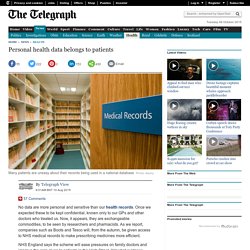
Once we expected these to be kept confidential, known only to our GPs and other doctors who treated us. Now, it appears, they are exchangeable commodities, to be seen by researchers and pharmacists. As we report, companies such as Boots and Tesco will, from the autumn, be given access to NHS medical records to make prescribing medicines more efficient. NHS England says the scheme will ease pressures on family doctors and improve the care given to patients in the High Street. Yet what evidence does it have to support this assertion? Cancer survival rates in the UK are lagging behind those in the rest of the world Photo: ALAMY The pharmacists, however, declared the experiment a success so it is to be extended across the country. We should not stand in the way of an efficacious use of so-called Big Data for the wider benefits of us all; but equally such information should not be distributed simply because it can be.
Ogólnopolski System Ochrony Zdrowia by Ogólnopolski System Ochrony Zdrowia OSOZ. eHealth Week 2015: Europe needs innovations. EU_eHealth sur Twitter : "29-30/6 Riga #Health Conference: better EU #health systems incl #ehealth: @EU_Health @eu2015lv. Universal health: Investing in Health and Wellbeing for All. Health literacy and the role of technology in Europe. Workshop hashtag: #eHealthSTOA WebStreaming.

Paul Sonnier sur Twitter : "Medical #WearableTech #DigitalHealth solutions @Hexoskin @Vivonoetics @cortrium @bazifitness. List of Digital Health Solutions. Digital health solutions range the gamut from consumer, medical, and clinical devices, apps, and related services leveraging them, to genetic and DNA testing to whole genome sequencing, and all combinations therein.
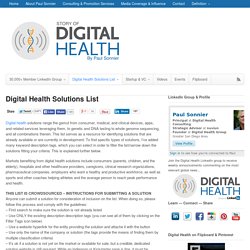
This list serves as a resource for identifying solutions that are already available or are currently in development. To find specific types of solutions, I’ve added many keyword description tags, which you can select in order to filter the list/narrow down the solutions fitting your criteria. This is explained further below. Markets benefiting from digital health solutions include consumers (parents, children, and the elderly), hospitals and other healthcare providers, caregivers, clinical research organizations, pharmaceutical companies, employers who want a healthy and productive workforce, as well as sports and other coaches helping athletes and the average person to reach peak performance and health. eHealthWeek15 sur Twitter : "#eHW15: #mHealth Stakeholder Meeting will discuss future of mobile #health - @EU_eHealth. mHealth at eHealth Week 2015. EU_eHealth sur Twitter : "'Use of #mHealth can reduce the impact of demographic change' via @Parlimag #eHW15 #ageing.
Use of mHealth can reduce the impact of demographic change. A question certain to be raised at this year's eHealth week is whether mobile health can provide an answer to the increasing needs of Europe's ageing population.
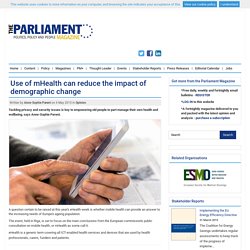
The event, held in Riga, is set to focus on the main conclusions from the European commission's public consultation on mobile health, or mHealth as some call it. eHealth is a generic term covering all ICT-enabled health services and devices that are used by health professionals, carers, funders and patients. mHealth covers all initiatives that seek to enhance the health and wellbeing of individual patients through the use of mobile communication devices, such as mobile phones, tablet computers, patient monitoring devices and other wireless devices, and are targeted at individual citizens and patients. World of Health IT sur Twitter : "A great possibility to honor #eHealth #professionals - #LeadershipAward still open this week! eHealth Week Riga 2015. HIT Consultant Media sur Twitter : "Google Granted Patent for Smart Contact Lens for #Diabetes #digitalhealth #mhealth.
Google Granted Patent for Smart Contact Lens for Diabetes. HIT Consultant Media sur Twitter : "11k Sign Up for Apple's ResearchKit In Less Than 24 Hours #mhealth #hitsm. 11k Sign Up for Apple's ResearchKit In Less Than 24 Hours. In less than 24 hours after the launch of Apple’s ResearchKit platform, Stanford University researchers announced that 11,000 people have already signed up for a cardiovascular study, Bloomberg reports.
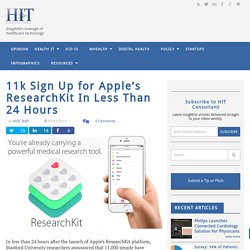
The new open source software framework is designed to help doctors and scientists recruit more participants in medical research studies needed to provide a more useful representation of the population using iPhone apps. With a user’s consent, ResearchKit can seamlessly tap into the pool of useful data generated by HealthKit — like daily step counts, calorie use, and heart rates — making it accessible to medical researchers. “To get 10,000 people enrolled in a medical study normally, it would take a year and 50 medical centers around the country,” said Alan Yeung, medical director of Stanford Cardiovascular Health. “That’s the power of the phone.” The first five apps launched on ResearhKit focuses on Parkinson’s disease, diabetes, cardiovascular disease, asthma and breast cancer. StartUp Health Insider. Health & Life Sciences: Mobile Allows Doc... Mobile devices and technology have allowed clinicians to gather patient data at the point-of-care, access vital information on the go, and untether from traditional wired health IT infrastructures.
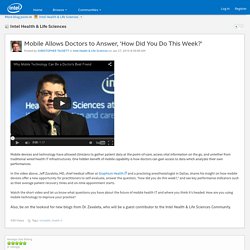
One hidden benefit of mobile capability is how doctors can gain access to data which analyzes their own performances. In the video above, Jeff Zavaleta, MD, chief medical officer at Graphium Health and a practicing anesthesiologist in Dallas, shares his insight on how mobile devices offer a new opportunity for practitioners to self-evaluate, answer the question, “how did you do this week?
mHealth in Clinical Trials: Instrumenting the Patient with Sensors, Wearables & Apps. David McNierney sur Twitter : "Top healthcare trend of 2015: mobile apps & consumer medical devices #mhealth #pharma #ehealth. PwC predicts “DIY Healthcare” will be the top trend of 2015. “Do-it-yourself healthcare”, including mobile apps and consumer medical devices, is set to be the top healthcare trend of 2015, according to research and consulting firm PricewaterhouseCoopers.
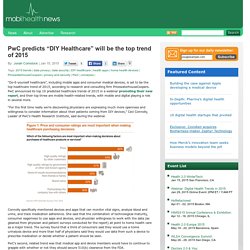
PwC announced its top 10 predicted healthcare trends of 2015 in a webinar promoting their new report, and their top three are mobile health-related trends, with mobile and digital playing a role in several more. “For the first time really we’re discovering physicians are expressing much more openness and willingness to consider information about their patients coming from DIY devices,” Ceci Connolly, Leader of PwC’s Health Research Institute, said during the webinar. Connolly specifically mentioned devices and apps that can monitor vital signs, analyze blood and urine, and track medication adherence.
mHealth in Europe: Preparing the ground – consultation results published today. 211 separate responses from public authorities, healthcare providers, patients' organisations and web entrepreneurs, inside and outside the EU, gave feedback on eleven issues related to the uptake of mHealth in the EU.
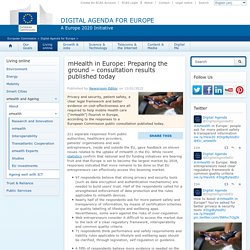
While recent statistics confirm that national and EU funding initiatives are bearing fruit and that Europe is set to become the largest market by 2018, responses indicated that more remains to be done so that EU entrepreneurs can effectively access this booming market. 97 respondents believe that strong privacy and security tools (such as data encryption and authentication mechanisms) are needed to build users' trust. Half of the respondents called for a strengthened enforcement of data protection and the rules applicable to mHealth devices.
Nearly half of the respondents ask for more patient safety and transparency of information, by means of certification schemes or quality labelling of lifestyle and wellbeing apps. Artur Olesch sur Twitter : "#eHealth open calls/access to finance/ resources for entrepreneurs @EU_eHealth @BenoitAbeloos @EU_H2020. ISFTeH - International Society for Telemedicine and eHealth. mHealth News sur Twitter : "Want employees to use #wearables? << Pay for them. #mHealth... Want employees to use wearables? Pay for them. Looking for some way to convince consumers to track their health and wellness?
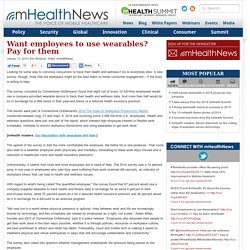
So is everybody else. A new survey, though, finds that the workplace might be the best realm to foster consumer engagement – if the boss is willing to help. The survey, compiled by Cornerstone OnDemand, found that eight out of every 10 full-time employees would use a company-provided wearable device to track their health and wellness data. And more than half would do so in exchange for a little boost in their year-end bonus or a reduced health insurance premium. The results were part of Cornerstone OnDemand's 2014 The State of Workplace Productivity Report, conducted between Aug. 21 and Sept. 8, 2014 and involving some 2,009 full-time U.S. employees.
[mHealth masters: Our fascination with wearables will fade.] The upshot of the survey is that the more comfortable the employee, the better he or she produces. Can a Smartphone Tell if You’re Depressed? Early Detection of Patient Deterioration. Zephyr Technology Corporation - Measure Life... Anywhere! Zephyr is a global leader in real-time physiological and biomechanical monitoring, or Physical Status Monitoring (PSM) solutions for mHealth, Defense, First Responder, Training and Research markets.
Proteus Digital Health. Vaxxas Nanopatch - Home. Best of 2014: From price transparency to Internet of Things, 7 infographics for healthcare. In the run-up to Christmas I went into my favorite used book store in Philly and treated myself to a book on graphic art used in Joseph Pulitzer’s newspaper The World from 1898-1911.
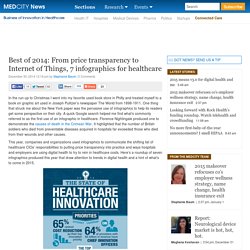
One thing that struck me about the New York paper was the pervasive use of infographics to help its readers get some perspective on their city. A quick Google search helped me find what’s commonly referred to as the first use of an infographic in healthcare. Florence Nightingale produced one to demonstrate the causes of death in the Crimean War. It highlighted that the number of British soldiers who died from preventable diseases acquired in hospitals far exceeded those who died from their wounds and other causes. M-health: Health and appiness.
WHEN Kenneth Treleani was told last summer that he was suffering from high blood pressure, his doctor prescribed medicine to tackle the condition. He also made another recommendation: that Mr Treleani invest in a wireless wrist monitor that takes his blood pressure at various times during the day and sends the data wirelessly to an app on his smartphone, which dispatches the readings to his physician. Mr Treleani says the device (pictured), made by a startup called iHealth, has already saved him several visits to the doctor’s surgery. Portable blood-pressure monitors have been around for a while. But the idea of linking a tiny, wearable one to a smartphone and a software app is an example of how entrepreneurs are harnessing wireless technology to create innovative services. Mobile Medical Apps: A Market on the Move. Wearable Computing: A 2014 HorizonWatching Trend Summary Report. Mobile Medical Apps: A Market on the Move. No question about it: The world wants mobile medical apps (MMAs)—and demand won’t slow down any time soon.
“The demand for remote patient monitoring is growing dramatically,” says Jeannette Tighe, from the HealthTech Advisory practice at Sagentia, a global technology advisory and product development company headquartered in Cambridge, U.K. How dramatically? Let the numbers tell the story. By 2015—next year—at least 500 million smartphone users worldwide will be using health-related apps, says Tighe, who recently spoke at MIT Technology Review’s EmTech conference in Cambridge, Massachusetts. By 2017, the app market is projected to reach 26 billion users. mHealth development services. Powered by 10+ years of mobile and healthcare expertise, Mindfire creates modern mHealth apps for providers and patients — thus enabling exceptional results in healthcare quality, effectiveness & accessibility.
The widespread use of tablets, smartphones, handheld devices etc. by physicians and patients has resulted in mHealth solutions being actively used in diagnosis, treatment, monitoring and education. Mindfire has the distinction of being a premier development partner for providing customized mHealth services in US & Canadian healthcare industry. Tinnitus-Therapie jetzt mit eigener Musik - Tinnitracks. iHealth Align is a tiny glucometer that plugs into your smartphone. iHealth Align is a tiny glucometer that plugs into your smartphone. iHealth Align is a tiny glucometer that plugs into your smartphone. 4 Tips to Marketing Your mHealth App. Mobile apps are exploding including Mobile Health apps.
Consumers launched nearly eight mobile apps per day in 2012. So, the question is: How do you get traction for your mobile health app? Follow these 4 Essential Tips for Marketing Your mHealth App from this Entrepreneur article: 1. Solve a Problem- What health related problem does your mobile app solve? 2. 3. 4. mHealth Devices. BANs and Sensors.